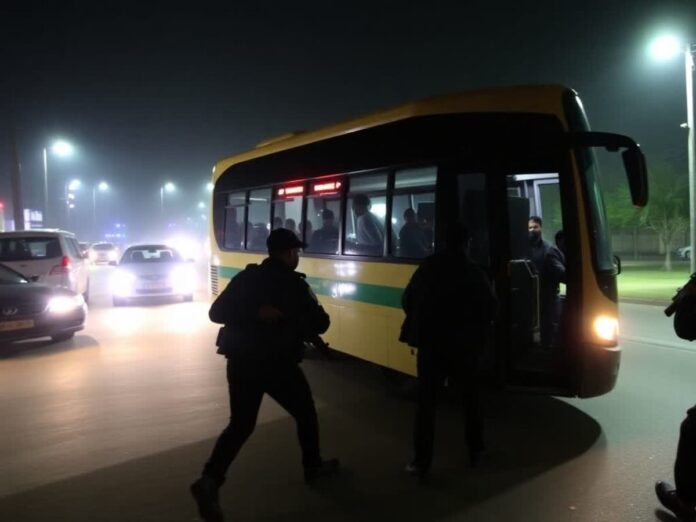In a chilling episode of targeted violence, nine bus passengers were abducted and brutally killed by armed assailants in Pakistan’s restive Balochistan province. Authorities suspect the involvement of Baloch separatist militants, although no group has officially claimed responsibility so far.
Article Contents
The incident has triggered national concern over growing insecurity in the southwestern province, which borders Iran and Afghanistan and has long been a hotbed of insurgency.
The Attack: Abduction from Passenger Buses
According to official reports, the attackers struck on Thursday evening, stopping multiple buses traveling through a remote area in Bolan district, a known volatile region in central Balochistan.
The assailants reportedly forced passengers off the buses at gunpoint, specifically selecting victims before disappearing into the nearby mountainous terrain.
❝”They were taken into the mountains and shot,”❞
confirmed Shahid Rind, a spokesperson for the provincial government.
Naveed Alam, another senior local official, stated that the bodies were found overnight with bullet wounds, indicating execution-style killings.
Who Were the Victims?
While the identities of the victims have not been fully disclosed, early reports suggest they were civilians traveling for work or family visits. Authorities are conducting forensic identification, and families have been called in to help confirm the deceased.
This targeted killing has sparked fears that the attackers may have selected individuals based on ethnicity or origin, a tactic seen in previous Baloch militant attacks.
No Claim of Responsibility Yet
As of Friday morning, no militant outfit has claimed responsibility for the Balochistan massacre. However, government sources and local analysts suspect that Baloch separatist groups, particularly the Baloch Liberation Army (BLA), could be behind the killings.
The BLA, which is labeled a terrorist organization by Pakistan, has been involved in several attacks targeting Punjabi settlers, government personnel, and infrastructure projects, especially those related to the China-Pakistan Economic Corridor (CPEC).
A History of Separatist Violence in Balochistan
Balochistan has long suffered from insurgency and civil unrest, with ethnic Baloch groups demanding greater autonomy and control over natural resources in the province. Rich in minerals, gas, and oil, Balochistan remains Pakistan’s most underdeveloped region.
Separatist militants often accuse the federal government—dominated by Punjab province—of economic exploitation and political marginalization.
Past attacks by Baloch militants have included:
-
Targeted killings of non-Baloch workers
-
Bombings near military posts
-
Railway line sabotage
-
Kidnappings of Chinese engineers and officials
Military and Government Response
The Pakistani military has launched numerous counter-insurgency operations in the region over the last two decades. While some militant networks have been disrupted, hit-and-run attacks and ambushes continue.
Following Thursday’s incident, security forces have launched a search operation in the mountains of Bolan and Mastung districts, where the bodies were recovered.
A high-level investigation is underway, and checkpoints across the province have been tightened. Interior Minister Mohsin Naqvi has condemned the incident, calling it a “cowardly act of terror” and vowing to bring the perpetrators to justice.
Ethnic Tensions in Pakistan Resurface
This incident also rekindles longstanding ethnic tensions between Baloch nationalists and the central government. In past attacks, passengers from Punjab or Sindh have been singled out and executed, further widening the ethnic divide.
Several human rights groups have also raised concerns about forced disappearances, extrajudicial killings, and lack of accountability in the province — both from militants and security forces.
Reaction and Fallout
Social media in Pakistan saw an outpouring of grief and outrage, with hashtags like #BalochistanAttack and #StopKillingCivilians trending across platforms.
Political leaders from all major parties condemned the killings:
-
Prime Minister called for an emergency security review in the province.
-
Balochistan Chief Minister pledged compensation for families and strict action against those responsible.
The UN Human Rights Office, which has previously flagged concerns about the Balochistan conflict, urged Pakistan to protect civilians and uphold rule of law.
Security Concerns Ahead of Religious Travel Season
The incident comes at a time when thousands are preparing for cross-country travel for religious pilgrimages and family gatherings during the Sawan season and upcoming Muharram.
Transport companies and bus operators in Balochistan are now under pressure to review safety protocols, while passengers are demanding armed escorts or security checks on long-distance routes.
Geopolitical Implications: Iran and Afghanistan Angle
Given Balochistan’s proximity to Iran and Afghanistan, intelligence agencies are also looking into possible external influences or support channels aiding local militant groups.
Pakistan has repeatedly accused foreign agencies of fueling separatism in Balochistan — a claim denied by neighboring countries. However, recent reports suggest that some insurgent groups are operating from across the border or receiving arms from international black markets.
Key Takeaways from Balochistan Attack (July 11, 2025)
-
Nine passengers kidnapped and shot dead in Bolan district, Balochistan
-
Armed men boarded multiple buses, selectively abducted victims
-
Bodies recovered overnight from mountainous terrain
-
No official claim yet, but Baloch separatists suspected
-
Pakistan military begins combing operation; security on high alert
-
Ethnic tensions and separatist unrest continue to destabilize the province
The Balochistan killings once again highlight the fragile nature of peace and governance in Pakistan’s most volatile province. With no claim of responsibility, the onus now lies on the Pakistani authorities to ensure justice, transparency, and civilian safety.
For real-time updates on South Asian conflict zones, border tensions, and counter-terrorism operations, stay connected with KKNLive.com — your trusted source for fact-based, in-depth journalism.




